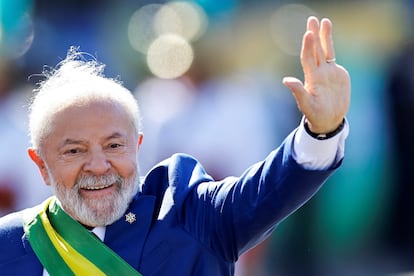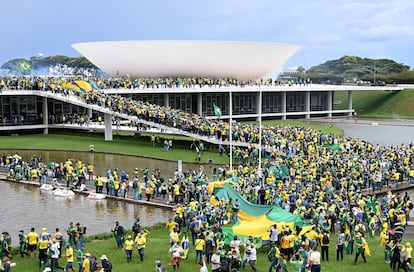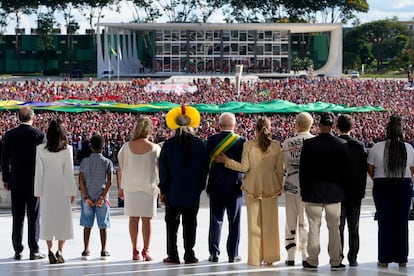Lula returns democratic normality to Brazil after Bolsonaro’s chaotic term
Economic growth has bolstered the president, who has just completed one year in power. His administration has prioritized the fight against hunger and poverty, while investing in public works and environmental protection


President Lula isn’t perfect, but he has fulfilled the main mission entrusted to him by the electorate of Brazil. The first day of January marked one year since Luiz Inácio Lula da Silva, 78, returned to the presidency of Brazil, at the culmination of an extraordinary political resurrection. Today, the country has settled into a semblance of peace. Democracy has regained its momentum and institutional normality reigns after the turbulent four years of the far-right administration led by Jair Bolsonaro (2018-2022). Lula’s third term (he previously served as president of Brazil from 2003 until 2010) began with a coup attempt by Bolsonaro’s supporters on January 8, 2022. It was neutralized within hours. The year then ended with a timid tax reform that is still historic, as it modifies an unjust and outdated tax system that was last altered more than three decades ago.
The fight against hunger — as 15% of the population goes to bed with an empty stomach — against poverty and the protection of the Amazon have, once again, become priorities under the Lula administration. Meanwhile, his predecessor has been banned from holding political office for several years.
The Brazilian economy has given the veteran president more joy than foreign policy. Brazil was welcomed with open arms upon its return to international forums; reductions in deforestation have been applauded. But the boomerang effect of Lula’s mediation attempts in Ukraine demonstrated how difficult it is to achieve diplomatic successes in a world that is much more complex than in his previous period in power, at the beginning of the century.
From the outside, the most populated country in Latin America has been transformed into a kind of oasis of stability that contrasts with the earthquake that the far-right Javier Milei has unleashed in Argentina, the fear of a war between Venezuela and Guyana due to the political calculations of Nicolás Maduro, the constitutional ups and downs in Chile and the authoritarian drift of Nayib Bukele in El Salvador.
The Brazilian president has dedicated this past year to making his motto — “Rebuild Brazil” — a reality. This is after the damage done to democracy, institutions, the balance of power and the environment by his predecessor. Part of his voters elected Lula precisely to save democracy from the attacks made by Bolsonaro, rather than out of unwavering support for his positions and proposals.

His main achievement is that the Brazilian political debate, once again, revolves around the major socioeconomic problems in the country and the difficulties of obtaining enough support to pass laws. There are no longer vulgar verbal attacks coming out of the presidential palace, nor are there attempts to criminalize political adversaries or circulate conspiracy theories.
“The comparison effect is of limited duration,” analyst Bruno Boghossian wrote this past Sunday in Folha de S.Paulo. “Not planning a coup, not threatening the courts, not wasting vaccines, not destroying the country’s reputation counts for a lot, but it’s insufficient,” he warned.
The lack of a parliamentary majority is the great obstacle that the president and his team face right now. The leader of the Brazilian left won the elections at the head of a broad coalition forged to save democracy. He presides over a cabinet that includes center-right parties. The municipal elections at the end of 2024 will offer a better idea about where the political forces stand in Brazil, after a presidential election that saw the national vote split between two blocs.
Bolsonaro, 68, has been politically incapacitated, although he lost the elections by a narrow margin. In June 2023, judges disqualified him from running for office for eight years, which knocks him out of the next two presidential elections. The reason for the ban wasn’t his mismanagement of the pandemic, nor the alleged coup incitement; rather, he was convicted over his abuse of power as head of state, in his attempt to delegitimize the electoral system.
After spending several months in the U.S., Bolsonaro hasn’t participated in any mass events back home in Brazil. His most faithful followers are calling for mobilizations next week in Brasília, on the anniversary of the violent assault on the headquarters of the presidency, the Supreme Court and Congress. The most hardcore Bolsonaro supporters trust that Milei’s victory in Argentina — and a hypothetical electoral victory by Donald Trump — will give their movement new vigor.
In any case, the former Brazilian president still has a wide range of legal cases open against him, including one in which the Supreme Court is investigating him for encouraging an attempted coup (which seemed to be copied from the assault on the Capitol in Washington). The main perpetrators are being sentenced to long prison terms by the Supreme Court. President Lula — who, two weeks after the riot, dismissed the head of the Army — has tried to ease his tense relationship with the military by making state investments in the defense industry.
The Lula of 2023 is very similar to the Lula of 2003, although he has two decades more experience… including some time spent in prison. Returning to the Planalto Palace, he has reformulated, updated and relaunched his social programs, fulfilling the promise that he made two decades ago to include the poorest Brazilians in the federal budget. The anti-poverty subsidies from the Bolsa Familia program — which Bolsonaro increased spectacularly during the pandemic — have been maintained by Lula. They are essential for millions of families to be able to live with dignity. However, to collect this aid, it’s now mandatory to get children vaccinated and ensure that they go to school.
For the first time in five years, the minimum wage has increased more than inflation. The government launched a mammoth public investment program worth $320 billion to reactivate economic activity, while the subsidies to encourage university entry for the poorest Brazilians — many of whom hail from Indigenous and African backgrounds — have been expanded.
Lula and his wife, Janja, used his inauguration on January 1, 2023, to include a handful of Brazilian citizens who belong to groups that are underrepresented in political power, such as women, Afro-Brazilians, the poor, Indigenous people and those living with disabilities. They ascended the ramp that leads to the presidential palace together.

Although he began his term boasting that a third of the cabinet was female, he has dispensed with three women ministers to make way for men from parties whose votes are crucial to moving forward with his legislative agenda. This has been a disappointment for the feminist movements and the most progressive Brazilians, who carried out an impressive public pressure campaign for President Lula to appoint a Black woman to one of the two Supreme Court vacancies. In both cases, however, he has appointed men who are his close allies: the lawyer who freed him from prison and his former minister of justice.
The economy has been the bright spot of his tenure. Brazil’s GDP grew by 3% in 2023, four times more than what was predicted when Lula took office. Unemployment is the lowest in almost a decade, while inflation continues to ease. Lula’s surprising bet of placing his most faithful collaborator — his potential successor Fernando Haddad, of the Workers’ Party — as a strongman in the economy portfolio has paid off. Haddad and his team have managed to get Congress to approve the simplification of the baroque tax system, while finally introducing a value-added tax, which will be around 27%.
For 2024, there remains the titanic task of addressing the mother of all issues: income tax reform. Another of Lula’s main goals this year is also to expand a support program for the renegotiation of domestic and business debts, which suffocate a good part of his compatriots.
The Brazilian left has recovered from the trauma of Dilma Rousseff’s impeachment in 2016. Lula — her mentor — has rehabilitated her, by sending her to Shanghai as president of the BRICS bank. Lula wants to take advantage of the presidency of the G-20, which he now holds, so that Brazil can recover the shine of yesteryear.
Sign up for our weekly newsletter to get more English-language news coverage from EL PAÍS USA Edition
Tu suscripción se está usando en otro dispositivo
¿Quieres añadir otro usuario a tu suscripción?
Si continúas leyendo en este dispositivo, no se podrá leer en el otro.
FlechaTu suscripción se está usando en otro dispositivo y solo puedes acceder a EL PAÍS desde un dispositivo a la vez.
Si quieres compartir tu cuenta, cambia tu suscripción a la modalidad Premium, así podrás añadir otro usuario. Cada uno accederá con su propia cuenta de email, lo que os permitirá personalizar vuestra experiencia en EL PAÍS.
¿Tienes una suscripción de empresa? Accede aquí para contratar más cuentas.
En el caso de no saber quién está usando tu cuenta, te recomendamos cambiar tu contraseña aquí.
Si decides continuar compartiendo tu cuenta, este mensaje se mostrará en tu dispositivo y en el de la otra persona que está usando tu cuenta de forma indefinida, afectando a tu experiencia de lectura. Puedes consultar aquí los términos y condiciones de la suscripción digital.








































